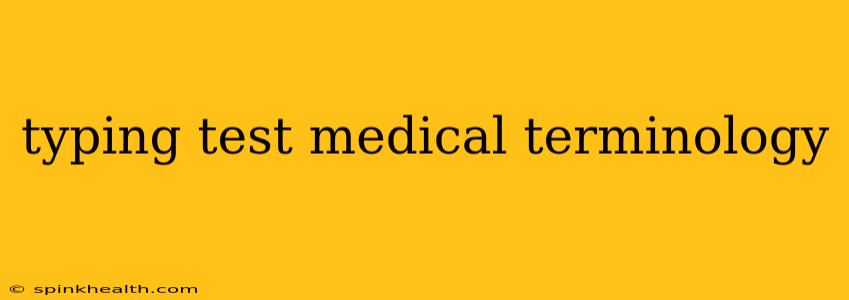The sterile scent of antiseptic hung in the air, the rhythmic click-clack of keyboards a counterpoint to the hushed urgency of the hospital. For medical professionals, typing isn't just about speed; it's about accuracy, efficiency, and ultimately, patient care. A single typo in a prescription or patient record can have devastating consequences. That's why mastering medical terminology typing is crucial. This isn't just about hitting keys; it's about navigating a complex language with precision and confidence.
This blog post will guide you through the world of medical terminology typing tests, exploring why they're important, how to prepare for them, and the resources available to sharpen your skills. Think of it as your personal training manual for conquering the medical keyboard jungle.
Why are Medical Terminology Typing Tests Important?
Many healthcare settings use typing tests as part of their hiring process. These tests aren't just about assessing your raw typing speed; they gauge your ability to accurately and efficiently handle the specialized vocabulary of the medical field. Imagine the chaos if a doctor, nurse, or medical coder makes even a small mistake in their documentation! The potential for misdiagnosis, treatment errors, and billing inaccuracies is significant. These tests ensure candidates possess the necessary skills to avoid such risks.
What skills are tested in a medical terminology typing test?
These tests aren't just about speed. They assess a blend of crucial skills:
- Accuracy: A single incorrect character can alter the meaning of a medical term, leading to serious repercussions. Accuracy trumps speed every time in this context.
- Speed: While accuracy is paramount, efficiency is also important. Healthcare professionals need to be able to document quickly and accurately without compromising quality.
- Knowledge of Medical Terminology: The tests often include common medical terms, abbreviations, and acronyms, assessing your understanding of the vocabulary. This goes beyond simple typing—it demands a working knowledge of the medical field.
- Keyboarding Skills: Proficiency in using a keyboard quickly and efficiently is essential, enabling you to keep pace with the demands of the job.
What types of medical terminology typing tests exist?
You might encounter various formats:
- Timed Tests: These tests assess your typing speed and accuracy within a specific timeframe. They often present passages containing medical terms.
- Untimed Tests: These tests emphasize accuracy over speed, allowing you to focus on correctly typing the medical terms provided.
- Tests with Corrections: Some allow for corrections, while others don't, mirroring the real-world constraints of different medical roles.
How can I prepare for a medical terminology typing test?
Preparation is key to success. Here's a step-by-step approach:
-
Familiarize Yourself with Medical Terminology: Start by reviewing common medical prefixes, suffixes, and root words. Numerous online resources and textbooks are available. Make flashcards, create quizzes – whatever works best for you.
-
Practice Typing Medical Terms: Use online typing tutors or practice typing medical terminology passages. Focus on accuracy first, then gradually increase your speed. There are websites specifically designed for medical terminology typing practice.
-
Take Practice Tests: Find sample medical terminology typing tests online. This will give you an idea of the format and difficulty level. It's also a great way to identify areas where you need improvement.
-
Focus on Accuracy: Don't sacrifice accuracy for speed. In the medical field, accuracy is paramount.
What resources are available for medical terminology typing practice?
Many online resources can help you prepare. Search for "medical terminology typing practice" to find suitable websites and software. Consider using typing tutors that allow customization, letting you focus on medical terms specifically. Textbooks and online courses focusing on medical terminology are also extremely helpful.
Can I improve my typing speed and accuracy?
Absolutely! Consistent practice is the key. Start slowly, focusing on accuracy. As you improve, gradually increase your speed. Use techniques like proper posture and finger placement to optimize your typing efficiency.
Conquering the medical terminology typing test is achievable with dedication and the right approach. Remember, it's not just about speed; it's about accuracy and the ability to confidently navigate the intricate language of medicine. Good luck!

